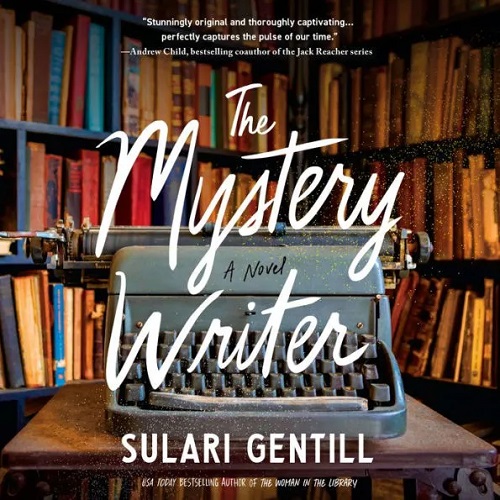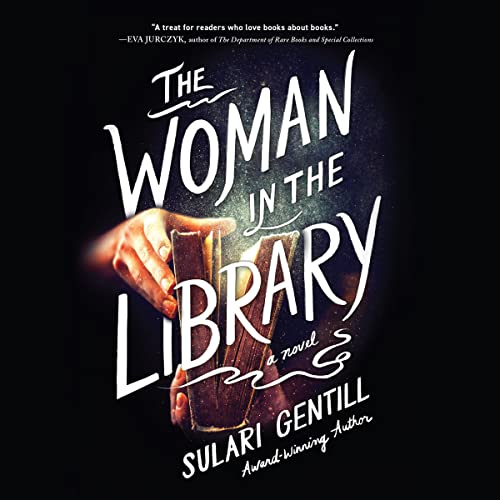 The Mystery Writer by Sulari Gentill
The Mystery Writer by Sulari Gentill Narrator: Katherine Littrell
Format: audiobook, eARC
Source: supplied by publisher via NetGalley
Formats available: hardcover, paperback, ebook, audiobook
Genres: mystery, suspense, thriller
Pages: 400
Length: 10 hrs 52 mins
Published by Dreamscape Media, Poisoned Pen Press on March 19, 2024
Purchasing Info: Author's Website, Publisher's Website, Amazon, Barnes & Noble, Kobo, Bookshop.org, Better World Books
Goodreads
There's nothing easier to dismiss than a conspiracy theory―until it turns out to be true.
When Theodosia Benton abandons her career path as an attorney and shows up on her brother's doorstep with two suitcases and an unfinished novel, she expects to face a few challenges. Will her brother support her ambition or send her back to finish her degree? What will her parents say when they learn of her decision? Does she even have what it takes to be a successful writer? What Theo never expects is to be drawn into a hidden literary world in which identity is something that can be lost and remade for the sake of an audience.
When her mentor, a highly successful author, is brutally murdered, Theo wants the killer to be found and justice to be served. Then the police begin looking at her brother, Gus, as their prime suspect, and Theo does the unthinkable in order to protect him. But the writer has left a trail, a thread out of the labyrinth in the form of a story. Gus finds that thread and follows it, and in his attempt to save his sister he inadvertently threatens the foundations of the labyrinth itself. To protect the carefully constructed narrative, Theo Benton, and everyone looking for her, will have to die.
USA Today bestselling author Sulari Gentill takes readers on a rollercoaster ride in The Mystery Writer, a literary thriller that turns the world of books and authors upside down and where a writer's voice is a thing to be controlled and weaponized, to the peril of everyone who loves a good story.
My Review:
The mystery – and the mystery writer herself – both kick off when a bedraggled, desperate Theodosia Benton knocks on her big brother’s door. Theo is uncertain of her welcome, but when her flight from Canberra fetches her up in Lawrence Kansas, she’s hoping against hope that the one person who has never failed her will rescue her one more time. Even if she and Gus haven’t seen each other in years.
Her hope in her brother is not misplaced. But her arrival pushes a small stone down a long, steep hill that gathers more than enough moss, snow and really big rocks to crush the lives that they are trying to build. And sweeps entirely too many people around them into its destructive path.
Depositing Theo – along with poor Gus and his ginormous dog Horse – and the heart of the deepest and darkest conspiracy theory that neither of them could have possibly seen coming. Not even their best friend’s family of obsessive, true believing conspiracy nuts.
 Escape Rating B-: I picked this up because I LOVED the author’s previous book, The Woman in the Library, and was hoping for more of the same. That isn’t what I got – emphasis on the “I” because I think that the reasons this book didn’t work for me until the very end were a “me” thing that may not be a “you” thing. Before I explain, let me state for the record that the dog is a VERY GOOD BOY and he’s doing FINE at the end of the story.
Escape Rating B-: I picked this up because I LOVED the author’s previous book, The Woman in the Library, and was hoping for more of the same. That isn’t what I got – emphasis on the “I” because I think that the reasons this book didn’t work for me until the very end were a “me” thing that may not be a “you” thing. Before I explain, let me state for the record that the dog is a VERY GOOD BOY and he’s doing FINE at the end of the story.
Even though I loved Horse nearly as much as Theo did, this book drove me bonkers. I was listening to it and it turned into a rage listen, but as much as the whole thing frustrated me no end, I couldn’t stop even though I couldn’t stand another minute. So I switched to text just to find out who done what and how and why a whole lot faster.
The audio was fine, and the narrator did a terrific job of dealing with Gus’ deliberately strong Aussie accent and Theo’s less pronounced one among all their American friends and neighbors. It was the story itself that was making me crazy, to the point where I tried thumbing to the end of the book just so I would know – but it didn’t make sense because things get very, very twisty at the end.
However, that twistiness did manage to redeem a great deal of my frustration, because the macguffin that powers this whole twisted mess that Theo has been dropped into was definitely a WOW to the point where it’s entirely too easy to fall down the rabbit hole of it being real. Really plausible anyway, in spite of itself. Or myself. Or both.
But it definitely middled in a place where it seemed obvious to this reader that there was a malign agency of some kind behind the way that Theo’s life goes so far down the road to hell in that handcart so fast. (Like Wednesday’s audiobook, people just aren’t THAT unlucky unless someone really is out to get them.) So I had a pretty good guess fairly on who was doing the dirty deeds – I just didn’t have the whys, the hows or the wherefores.
Which also frustrated me because I thought that at least one of the main characters, probably not Theo herself but either her older brother Gus or his friend Mac.
And that’s the point where I worked out that the part of the story that was not working out for this reader was that the entire house of cards relies on the protagonist’s innocence and naivete in order to work at all. And since the story is told from her perspective we get a lot of that naivete to the point where I just wanted to shake some sense into her. It’s not that she’s too stupid to live, it’s that she’s young and has led a rather peculiarly sheltered life in the remoter parts of an entirely different country.
Gus or Mac should have had a better perspective on just how high the terrible coincidences were piling up, and just how unlikely that was, as they are both a decade older than Theo and have, particularly in Mac’s case, considerably more knowledge of the way the world really does and doesn’t work. But the way the story works means that they are dealing with most of the events through what Theo tells them, and her naivete bleeds all over everything.
Plus, they are both trying really, really hard to protect her – even from her frequently misguided self.
In the end, I think the whole story and the way that it works can be summed up by the tagline that the most prominent group of conspiracy aficionados uses in their messaging, “We know what we know.”
The full quote, from Nicolaus Copernicus, feels like it’s a key to understanding the conspiracy theorists in the book as well as the book itself and how it hides its real mystery in plain sight.
“To know that we know what we know, and to know that we do not know what we do not know, that is true knowledge.” Clinging to what they know, the conspiracy theorists have no clue about all the many, many things they don’t know. Neither does Theo. And neither, as the book takes us on a not-so-magical mystery tour of the way that Theo’s, Gus’ and Mac’s lives go so very, very wrong, does the reader – at least not until the bitterly climactic end.

 The Woman in the Library by
The Woman in the Library by  Escape Rating A: I would have loved to stick with the audio of this, because the narrator was doing an excellent job with the large cast and especially with all the accents. I just ran out of time and switched to the text. But the narrator was very good and I’d be happy to listen to her again. She did a particularly terrific Australian accent – unless she is Australian in which case she did several terrific and different American accents!)
Escape Rating A: I would have loved to stick with the audio of this, because the narrator was doing an excellent job with the large cast and especially with all the accents. I just ran out of time and switched to the text. But the narrator was very good and I’d be happy to listen to her again. She did a particularly terrific Australian accent – unless she is Australian in which case she did several terrific and different American accents!)